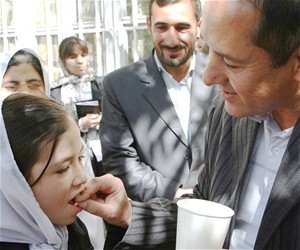
The National De-worming Campaign in Schools was launched on October 20, 2010 at Aisha Durani High School in Kabul.
IRD/SPR-SEA
USAID works with Afghan government ministries to enhance the health of school children in rural communities.
8 NOVEMBER 2010 | KABUL, AFGHANISTAN
Children across Afghanistan desire an education. However, they must overcome many challenges to succeed, as issues such as security, distance, poverty, and poor health undermine their ability to develop and thrive at school.
The Afghan Ministry of Education estimates that there are now seven million students in school, of which 37 percent are girls, attending 12,500 schools. This is a drastic improvement from 2002, when one million children, only boys, attended 3,400 schools across the country. While this growth in numbers of children attending school shows significant progress, 60 percent of the school-age population in Afghanistan is believed to be infected with intestinal parasites.
This seemingly simple problem, if left untreated, causes malnutrition; stunts growth; and causes severe anaemia, dysentery, delayed puberty, and problems with learning and memory. This, of course, affects children’s attendance rates as well as their ability to concentrate in class, impeding their academic progress and limiting their development at school.
To remedy this situation, USAID’s Strategic Provincial Roads project worked in close collaboration with the Ministry of Education, Ministry of Public Health, World Health Organization (WHO), UNICEF, and World Food Programme to secure a donation of $6.5 million in de-worming tablets to distribute to school-age children across Afghanistan.
“It has been an honor working hand-in-hand with these ministries and USAID to bring about real and practical solutions to the critical health and education issues effecting millions of children across the provinces of Afghanistan,” said Khadija Bahram, education officer for UNICEF.
The Escarpment Biosphere Foundation donated the de-worming tablets and MedPharm, WHO, and USAID facilitated the donation and shipping.
USAID’s Strategic Provincial Roads project takes a holistic approach to development, building roads in tandem with the development of vulnerable local agricultural communities that live alongside the strategic provincial roads.







Comment
Make a general inquiry or suggest an improvement.